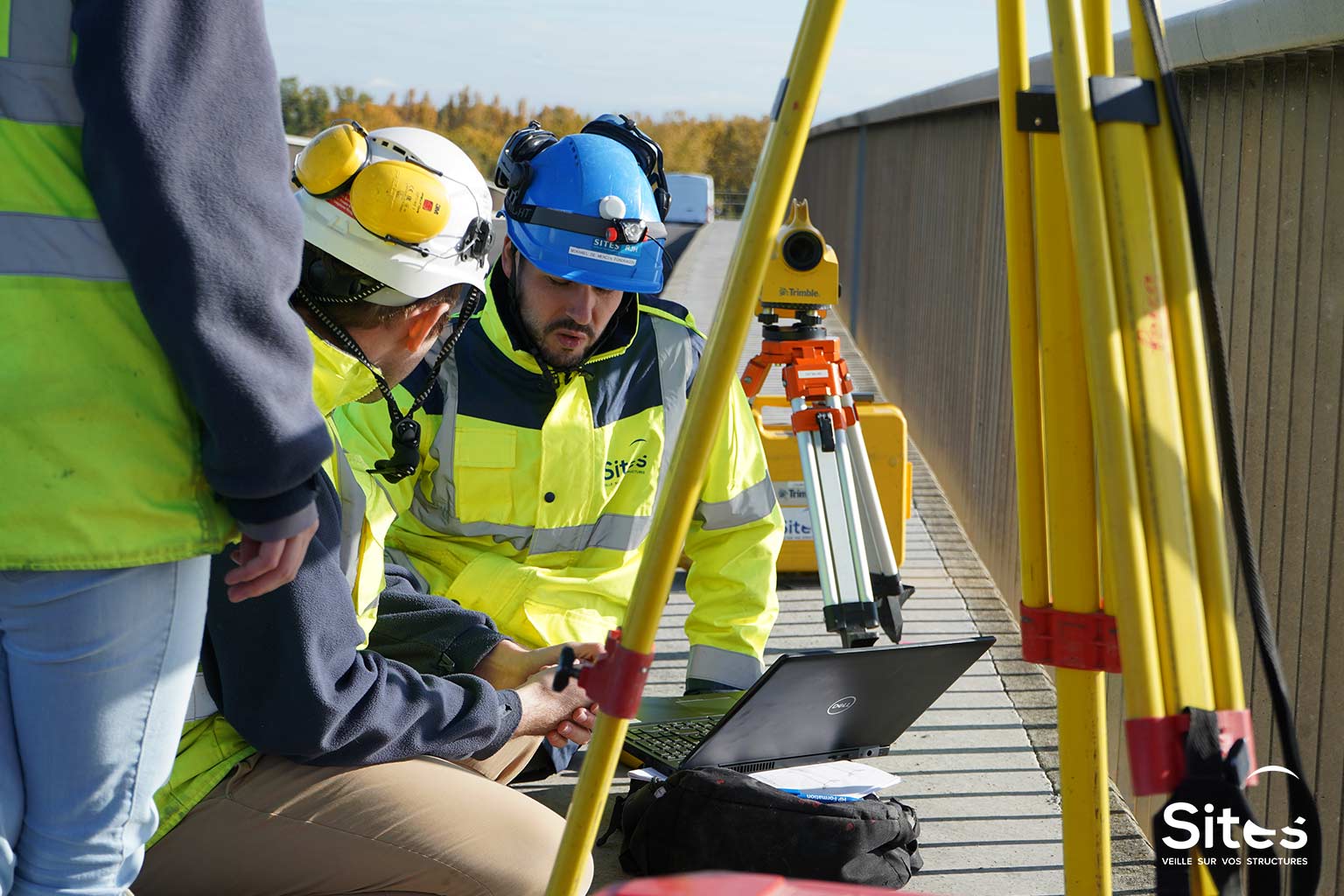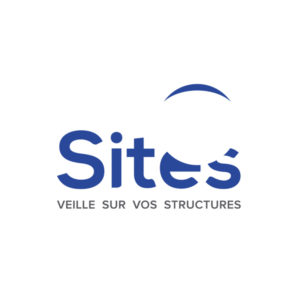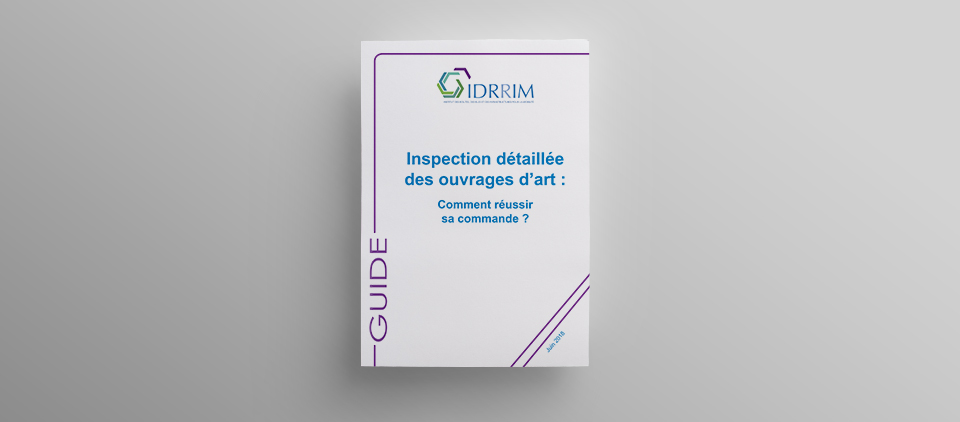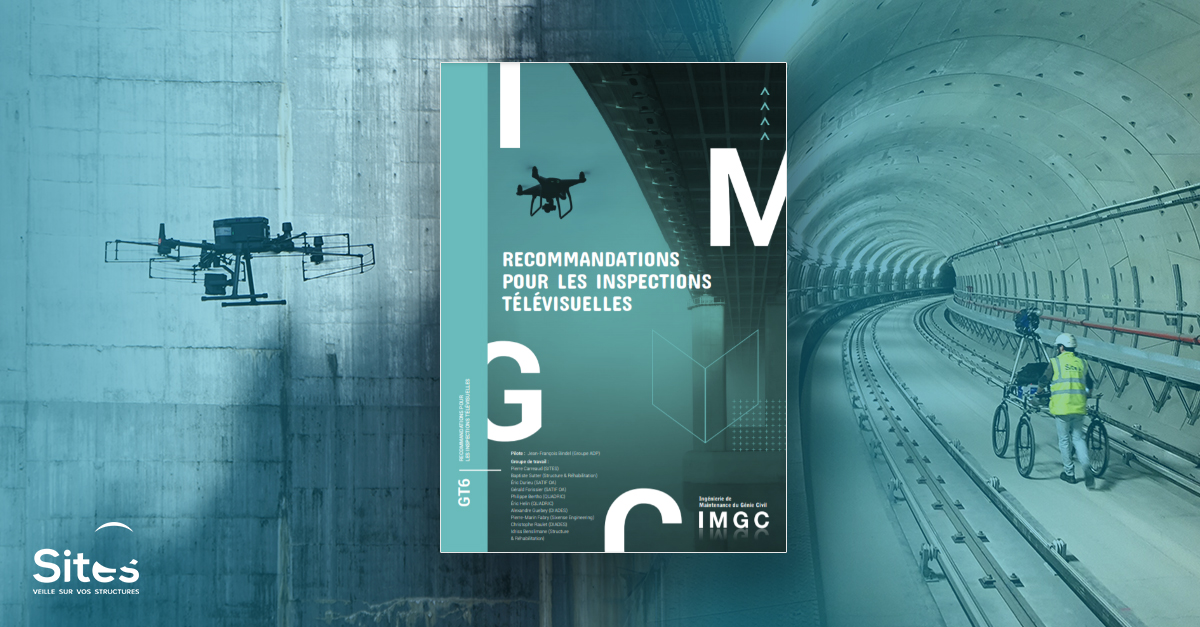Transportation infrastructure is an essential part of our economic, cultural and historical heritage. Engineering structures (bridges, viaducts, tunnels, retaining walls, dykes, quays, booms, footbridges, etc.), which are an integral part of these infrastructures, are essential to our daily lives and to the attractiveness of our regions. They also represent a high symbolic value of our collective engineering capacity.
As with all structures, the lifespan of engineering structures is limited by their ageing, whether natural or accelerated by their environment and operating conditions. Their ruin, always spectacular, is often tragic. Genoa in 2018, Mirepoix in 2019 and Aulla in 2020 are all reminders that the monitoring and maintenance of engineering structures are essential to ensure our safety and the full exploitation of their potential.
On this page, you’ll first discover the challenges of surveillance, then a panorama of the skills and solutions deployed by SITES.
Bridges, viaducts, footbridges, tunnels… Engineering structures that require increased surveillance
Whether old or new, road, rail, river, port and airport infrastructures are the backbone of the mobility of people and goods. Over time, their structures, subjected to a rapidly changing environment and sometimes to overuse, develop various pathologies more or less rapidly. Increased surveillance is therefore essential to monitor their evolution with the utmost care. Safety, sustainability, optimized operation, maintenance and upkeep costs are the current challenges facing managers, owners and operators of these infrastructures.
The collapse of the Morandi bridge in Genoa on August 14, 2018, sparked strong emotions around the world and rekindled debates on the state of France’s engineering structures heritage. In order to reassess how they are monitored and maintained, at the end of 2018 the French Senate set up a fact-finding mission dedicated to bridge safety. The Senate committee’s findings are clear-cut.
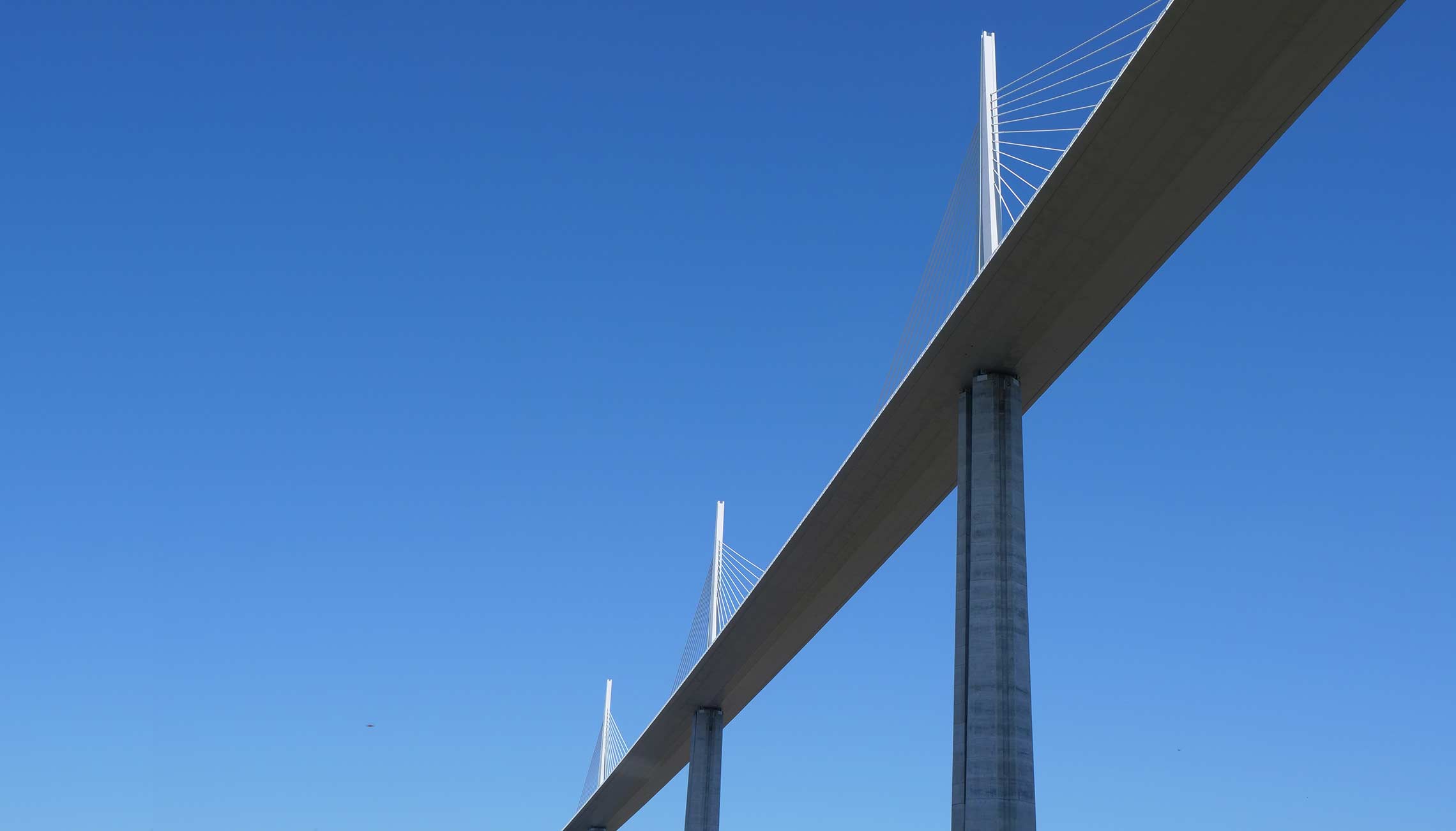
Guidelines and methodology for monitoring engineering structures
The collapse of the Wilson Bridge in Tours in 1979 triggered the introduction of a technical reference specifically dedicated to the monitoring and maintenance of engineering structures: ITSEOA (Instruction Technique pour la Surveillance et l’Entretien des Ouvrages d’Art).
From a technical point of view, there is currently a documentary database listing and describing precisely, for each type of structure, the majority of known pathologies in terms of causes and severity. This database is regularly updated to incorporate feedback and innovations in terms of construction techniques, methods and materials.
Monitoring methods and organization evolve regularly to take account of economic realities, innovations and the wide diversity of managers, operators and owners in terms of responsibility and asset size.
As a player in these developments, SITES is involved in a number of professional associations and training organizations.
The Maintenance Engineering Repository
In December 2019, the IMGC association (Ingénierie de Maintenance du Génie Civil) published a document entitled “Référentiel de l’Ingénierie de la Maintenance”, the fruit of collaborative work steered by Bertrand Collin, SITES infrastructure expert.
This publication is made up of a series of “Mission Sheets” relating to monitoring, diagnosis, project management studies, project management works, technical assistance and external inspection of existing civil engineering structures. It also presents an overview of the sequence of these tasks, and the options and follow-up required.
Major
sector events
– EuroBridge – Symposium Européen
– Colloque Le Pont
– Les journées de l’AFGC
– AFTES
– Journées Cofrend – SHM France
– Symposium IABSE Wroclaw (Pologne)
– Journées Génie Civil AFGC
– Journée Technique IMGC
SITES recommends
these external resources
– La Terre au Carré : ‘La science de la construction des ponts’ – France Inter
– C’est pas sorcier ‘Le viaduc de Millau’ – France 3
– Jean Echenoz, Caprice de la Reine : ‘Génie Civil’
– Affaires sensibles : ‘L’effondrement du barrage de Malpasset’ – France Inter
– Débat au Sénat : Séance publique du 2 octobre 2019
– Carnet d’entretien des ouvrages de génie civil
– RMC Découverte – Saint-Nazaire : le pont le plus long de France
– Michel Virlogeux, le bâtisseur de ponts – France Culture
– RMC Découverte – Génie français : les routes de tous les records
SITES and infrastructure monitoring
Since 1984, SITES has been providing solutions to monitoring issues. We offer all stakeholders in exceptional and current structural assets (owners, builders, managers, operators and insurers) studies, methods and solutions to assess and monitor the state of health of their structures over time, with several aims in mind: to guarantee the safety and durability of their use, to avoid any unexpected interruption of use and any costly unanticipated repairs.
Over the years, SITES and its teams have developed a range of tools and skills to optimize the expertise, surveillance, follow-up and real-time monitoring of structures.
Example of a structural assessment of a cable-stayed bridge
When carrying out a structural assessment of a cable-stayed bridge, SITES applies a wide range of skills: detailed inspection, measurement of support settlement and cable-stay tension.
This assessment is accompanied by recommendations that enable the operator to ensure the safety and durability of his engineering structures.
Example of a periodic detailed inspection of a tunnel
SITES teams carried out a Periodic Detailed Inspection (PDI) of the civil engineering structures of part of the Duplex A86 tunnel operated by Vinci Autoroutes (Rueil-Malmaison to Vélizy-Villacoublay).
During the shutdowns, SITES set up a system to thoroughly inspect 2325m of tunnel, including two traffic levels, air extraction/blowing ducts in the lower and upper sections, almost 9300 prefabricated reinforced concrete voussoirs and 2900 support devices.
Innovation for sustainable structures
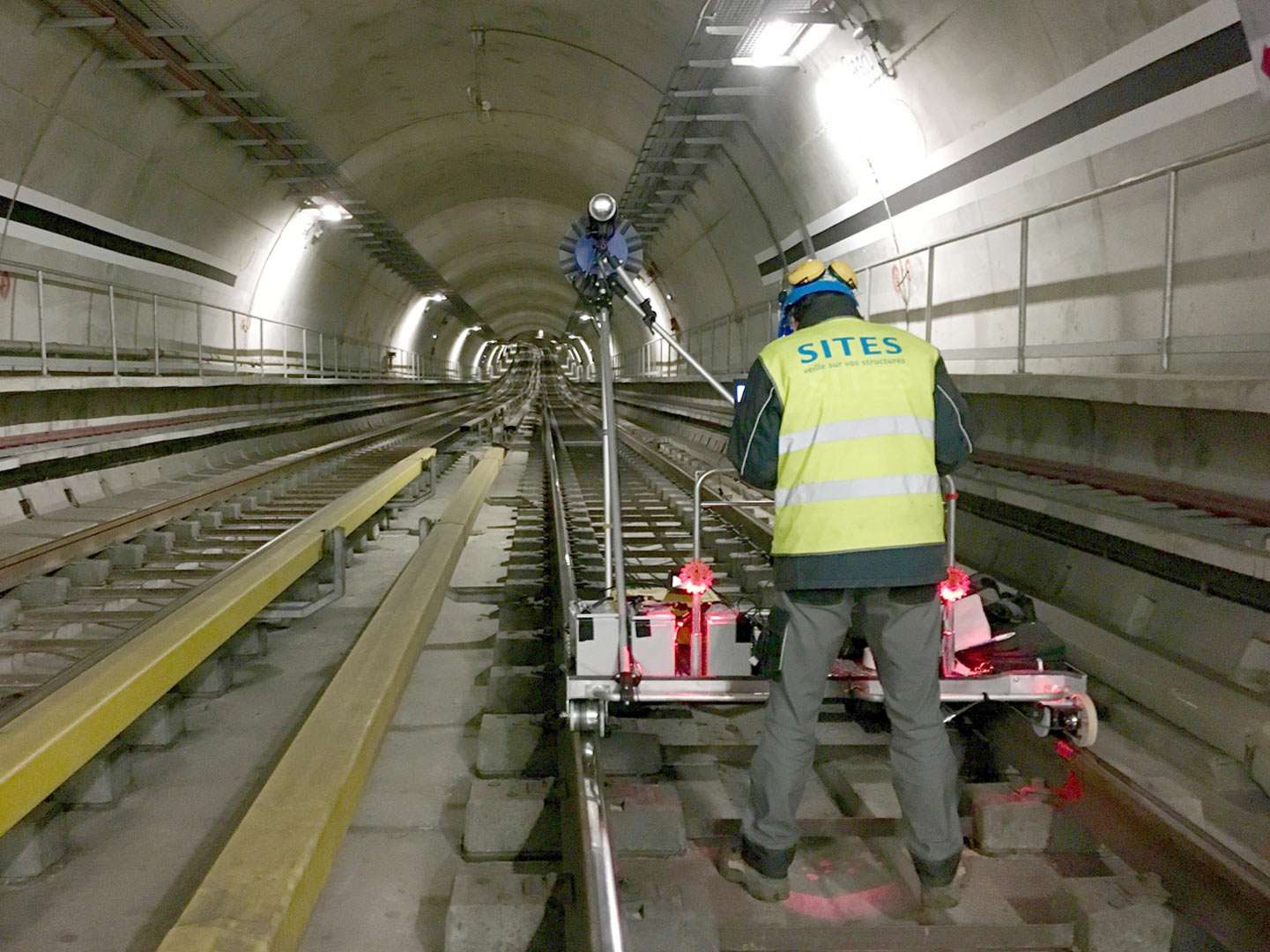
ScanTubes®: 3D surveying and photogrammetric inspection of tubular structures
The ScanTubes® tool developed by SITES scans horizontal or vertical tubular structures, automatically taking high-resolution 360° photos and capturing the structure’s 3D geometry via photogrammetric processing.
The tool is pushed onto a road or rail cart, or suspended from the end of a cable. It dynamically captures images from 12 calibrated digital industrial cameras.
The data acquired can be used to produce digital twins of the structures, enabling precise mapping of defects, giving an opinion on the condition of the structures and monitoring their ageing over time.
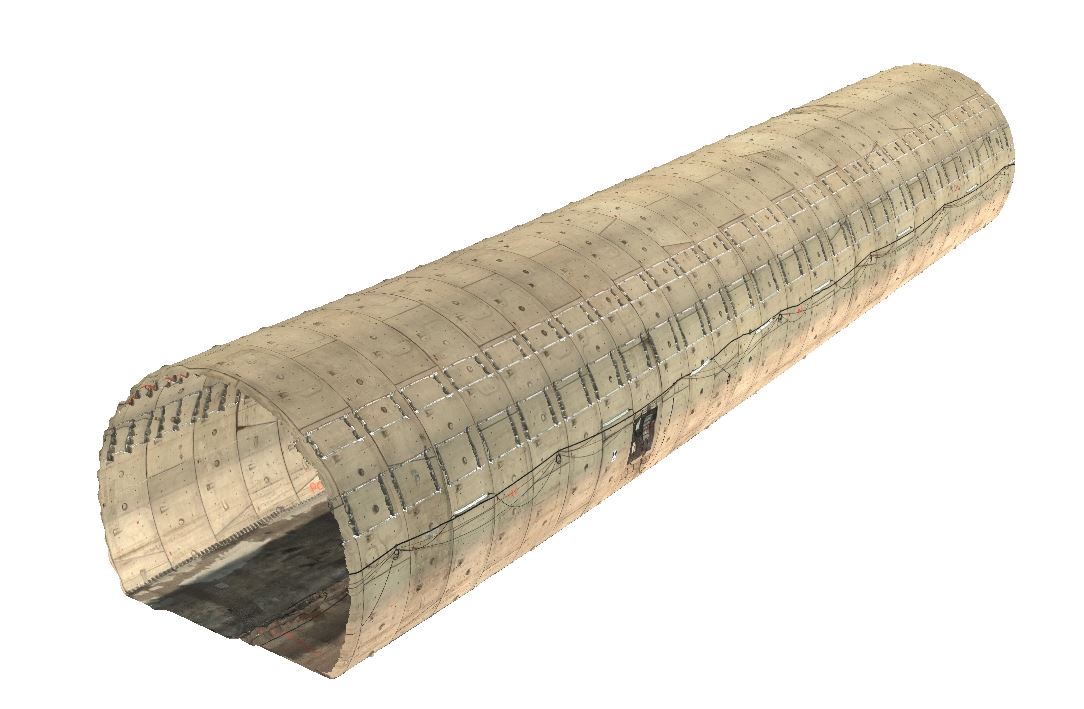
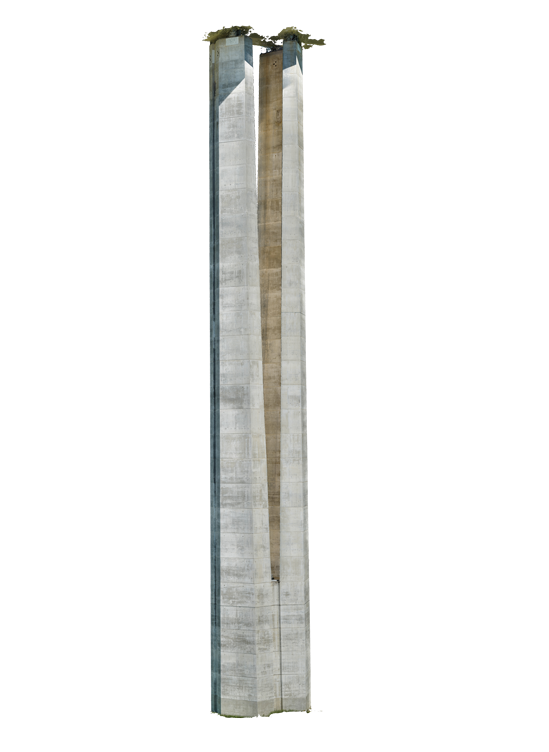
Drones to overcome constraints
For over 30 years, SITES has been developing special remote inspection equipment to make it easier to observe structures, while limiting the need for special equipment (scaffolding, rope access, gondolas, etc.). In this context, the drone makes it possible to overcome these difficulties, limit masked areas and get close enough to the structure to detect any disorders.
SITES has a fleet of drones that can be adapted to suit the needs, structures and environments investigated. Specially developed by SITES for the inspection of large structures (dams, viaducts, chimneys, cooling towers, etc.), these drones carry high-definition photographic sensors. In addition to all the systems required for stable, safe flight, they are fitted with servo-controlled rangefinders to maintain a constant distance from the structure and ensure consistent survey quality.

Example of a drone inspection
On behalf of the Conseil Départemental de la Côte d’Or, SITES’ civil engineering experts carried out a Periodic Detailed Inspection of masonry viaducts. Exhaustive HD mapping to scale enabled the current condition of the structure to be assessed, and any repairs to be accurately dimensioned for the immediate benefit of the project owner.
Field surveys carried out by drone improve worker safety by limiting the use of special access equipment (cherry pickers or rope access) and the time required to mobilize the structure, thereby reducing inconvenience to users. In the future, this digital archive will unequivocally support the study of structural evolution kinetics, enabling us to anticipate and plan maintenance operations at lower cost.
The IMGC association (Ingénierie de la Maintenance du Génie Civil) has published a guide entitled “Recommendations for televisual inspections”. This document is the fruit of several years’ collaborative work by IMGC’s GT6, led by Jean-François Bindel (ADP Group). SITES, represented here by Pierre Carreaud, is proud to have actively contributed to the elaboration of this document within the GT6 Working Group made up of several Design Offices and Project Owners. Click on the image to consult the IMGC guide.
Structural Health Monitoring (SHM) to understand and monitor structural behavior in real time
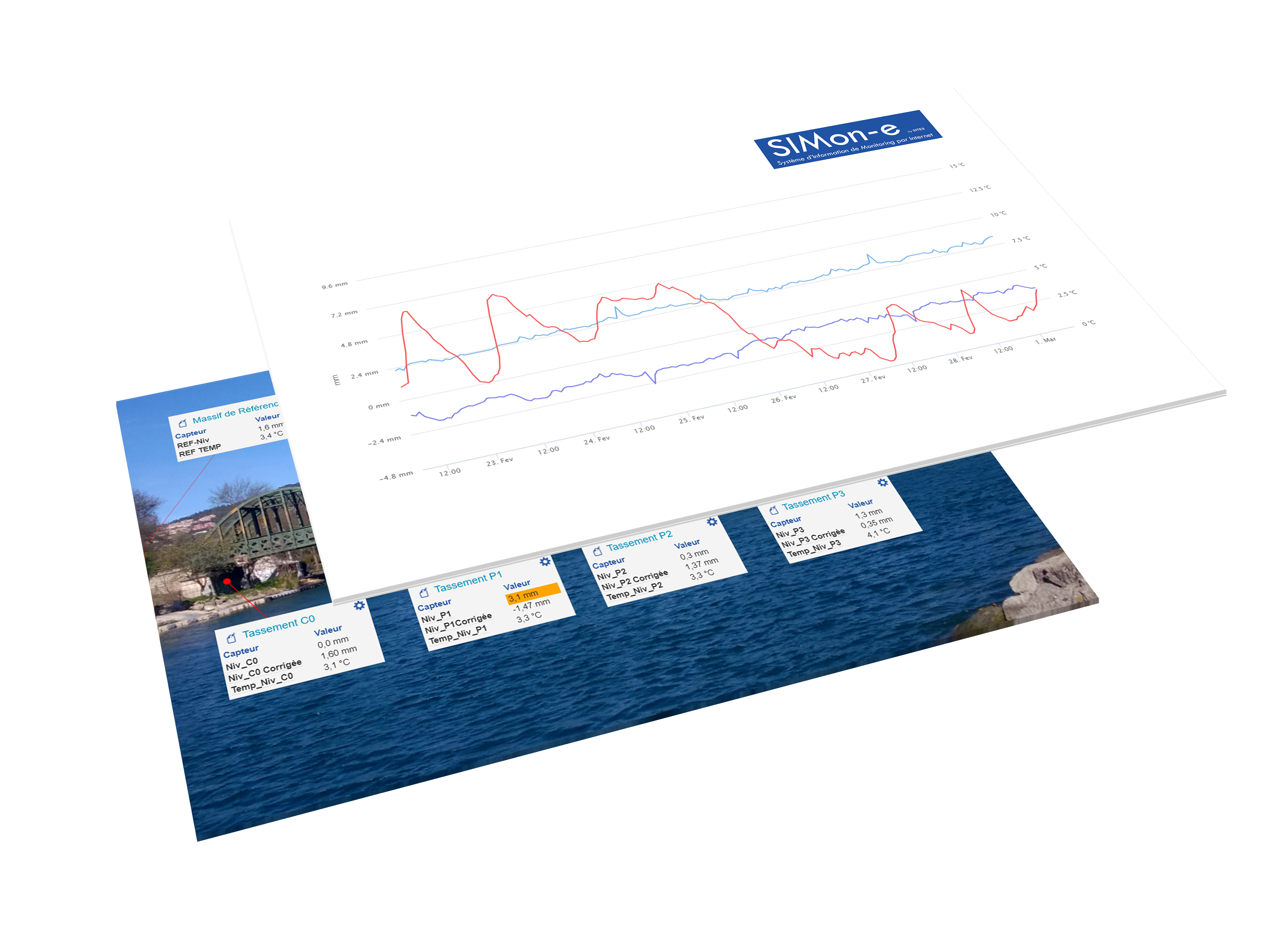
SIMon-E®, a digital ecosystem for tracking data
SIMon-E® is a simple, practical and comprehensive web platform developed by SITES, dedicated to monitoring information on instrumented structures: openings, joints, cracks, tilts, deformations, stresses, temperatures…
The system automatically collects data from the sensors installed on your structures, processes it and makes it available to you via the web interface or the highly secure SIMon-E® mobile application.
› 24/7 access to information,
› Receive email or SMS alerts based on defined thresholds,
› SIMon-E® formula tailored to each customer’s needs,
› Servers installed in France,
› Daily data backup,
› Designed for structural monitoring.
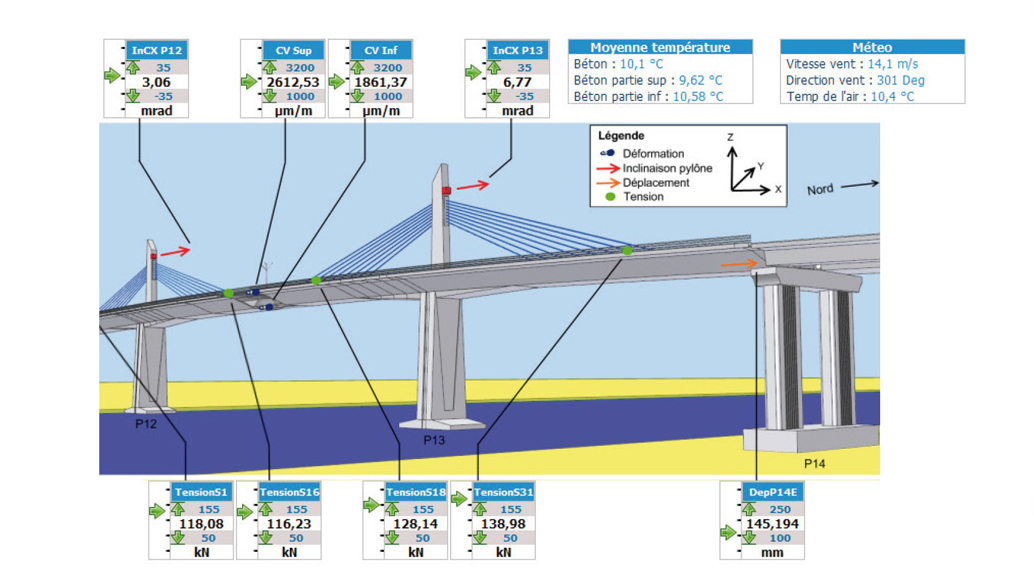
Example of bridge instrumentation
During the deconstruction of the Manosque Bridge, SITES teams designed and deployed a comprehensive monitoring system to track the structure’s behavior during all phases of the deconstruction work: mobility of support saddles, tension of cables, movements of pylon heads, deck deformations.
Monitoring, via the installation of sensors and robotized tacheometers, was set up to transmit data in real time via the dedicated SIMon-E® web platform.
A comprehensive offering for sustainable infrastructures
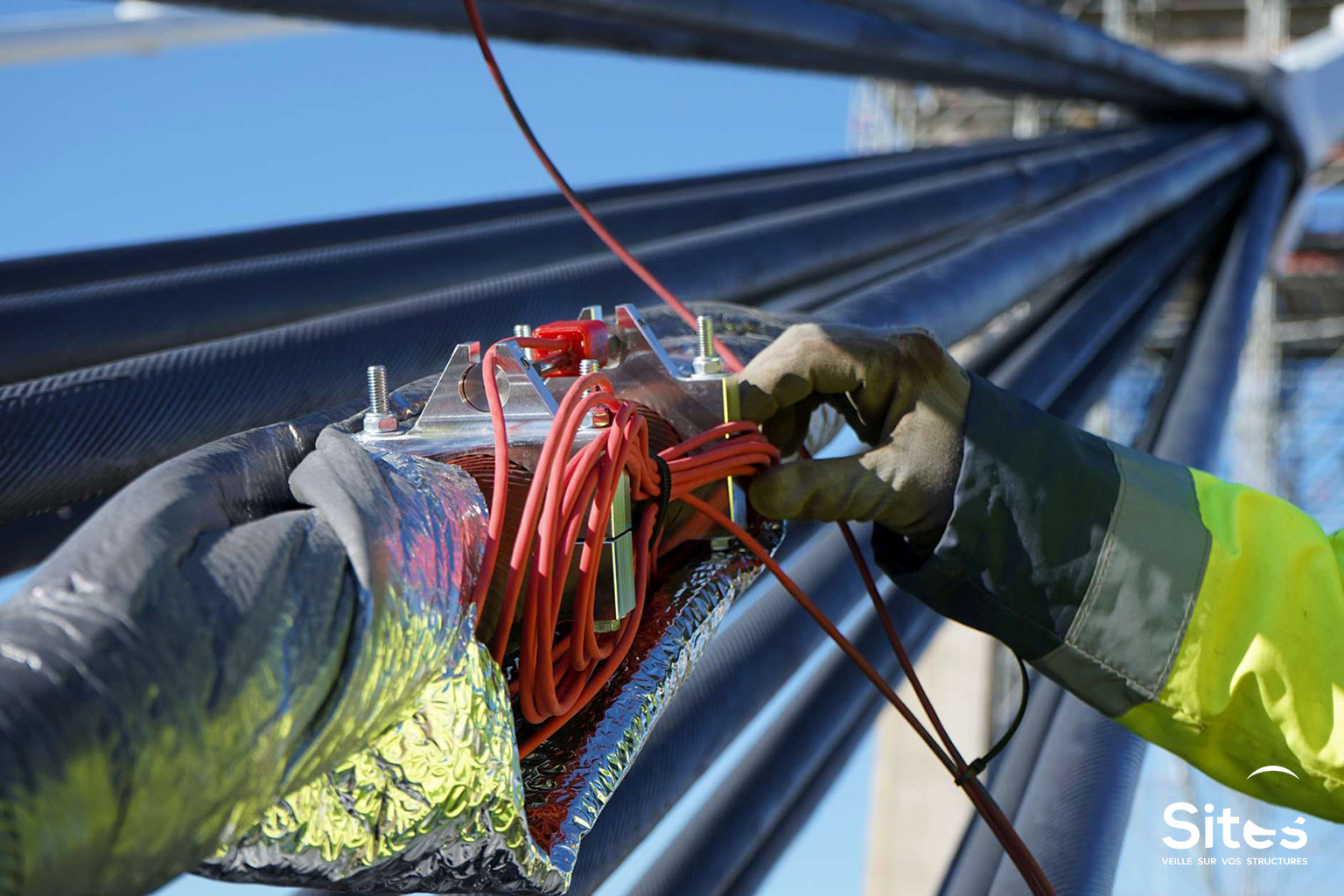
Global and independent partner for the sustainability of exceptional and current structural assets
Founded in 1984, SITES is a leading independent player, bringing its expertise and know-how to bear in the service of sustainable infrastructures. SITES, has over 400 doctors, engineers and technicians, 5 agencies in France, 3 subsidiaries in China, South Africa and Saudi Arabia, generating sales of 35.1 M€ in 2019.
With more than 5,000 structures monitored in France and abroad, SITES teams work on all types of structures (nuclear, transport infrastructure, energy, sensitive industry, heritage and historical monuments, buildings, natural surroundings and defense) with a broad spectrum of skills: engineering, monitoring, instrumentation, expertise, surveys or technical assistance to project owners.
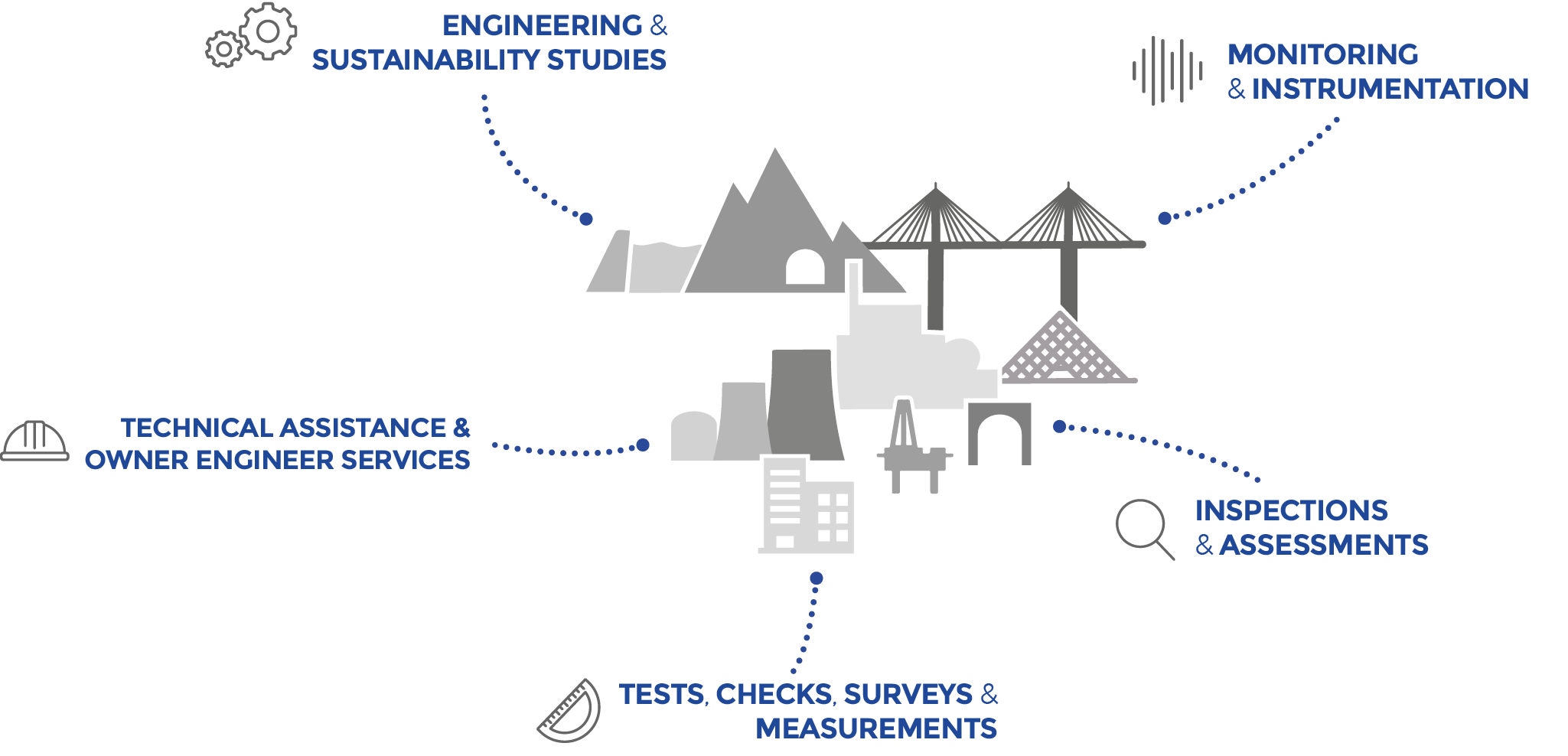
Would you like to be contacted by
one of our experts?
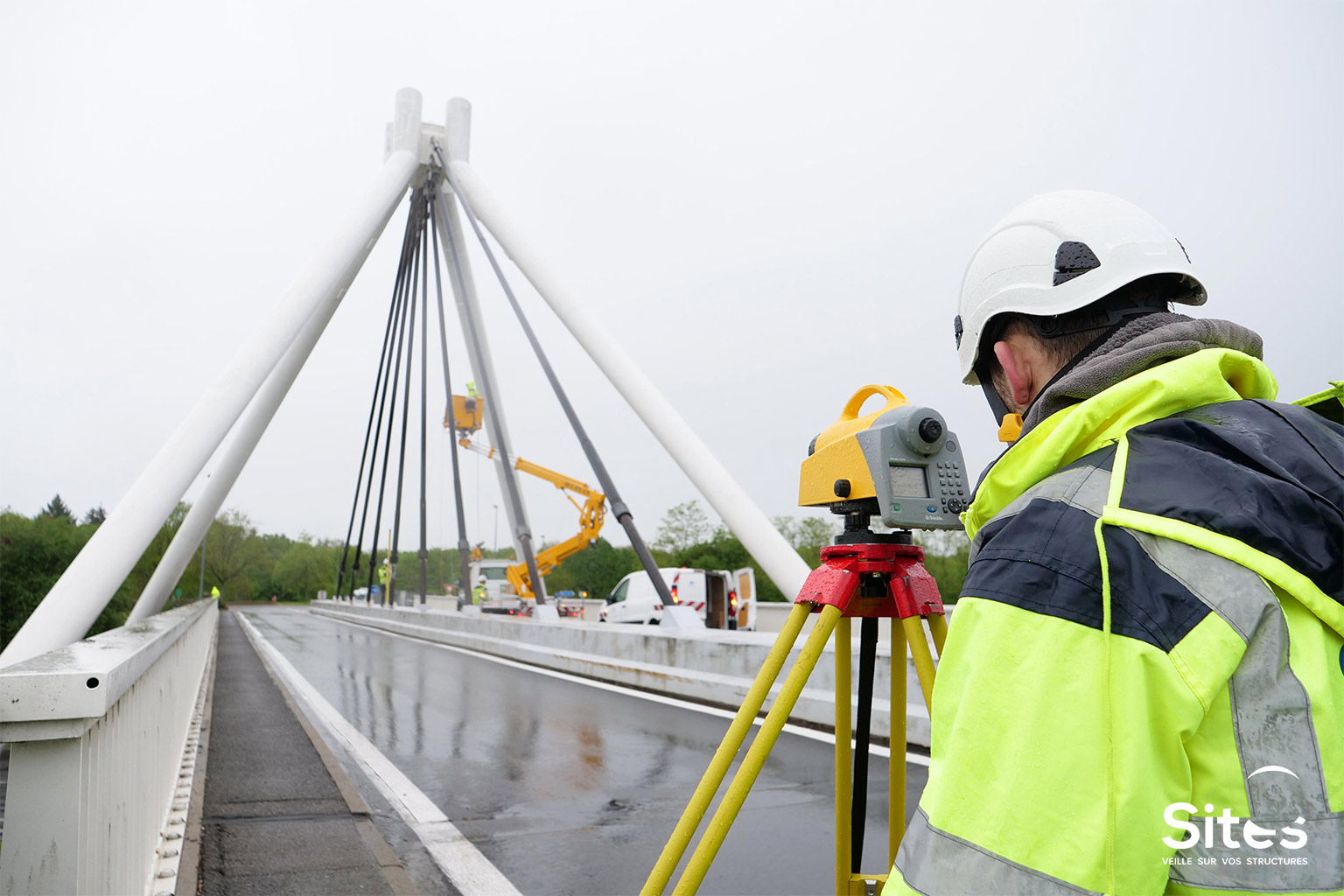
Please fill in the form below, taking care to enter all the information required to enable us to process your request as efficiently as possible.
We will get back to you as soon as possible.
SITES – Paris (siège social / agence de réalisation)
95-97, avenue Victor Hugo – 92500 RUEIL MALMAISON
Tél : +33 1 41 39 02 00
